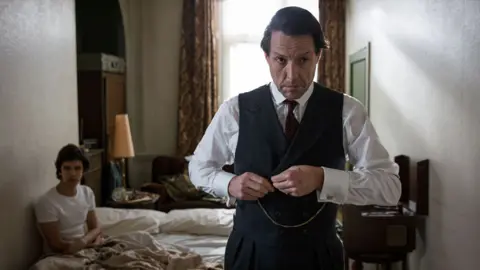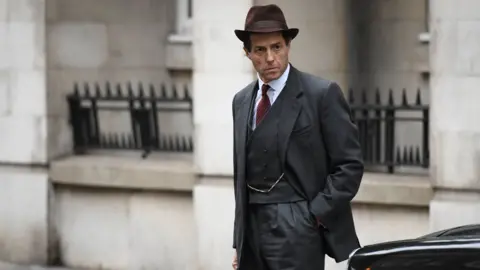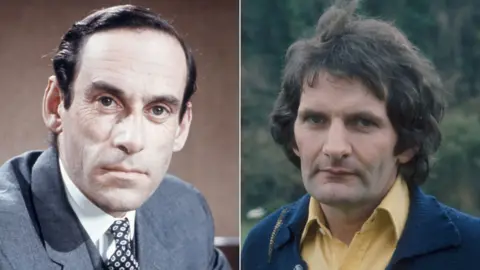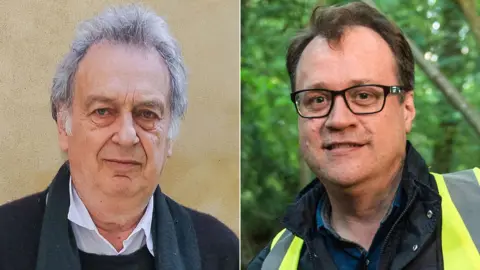Hugh Grant, politics and a murdered dog in Jeremy Thorpe drama
 BBC
BBCThe makers of A Very English Scandal, a BBC drama about shamed politician Jeremy Thorpe, explain why his story is still relevant.
A gay affair, a bungled plot and a dead dog on Exmoor were the ingredients of what came to be dubbed "the trial of the century".
At its centre was Jeremy Thorpe - leader of the Liberal Party, a pillar of the establishment and the first British politician to be tried for conspiracy and incitement to murder.
Now, almost 40 years on from Thorpe's sensational acquittal, the story behind the case is being retold in a three-part BBC drama.
Directed by Stephen Frears and written by Russell T Davies, A Very English Scandal stars Hugh Grant as Thorpe and Ben Whishaw as Norman Scott, the ex-lover he was accused of trying to have killed.
Based on John Preston's 2016 book, the dramatisation begins with Thorpe meeting and seducing Scott, a young and sexually inexperienced worker at a horse stables.
Once the affair has run its course, Thorpe finds Scott to be a persistent thorn in his side who poses a serious threat to his political ambitions.

At the end of episode one, Thorpe is seen exhorting a colleague (played by Alex Jennings) to arrange Scott's death, coldly reasoning that "it's no worse than shooting a sick dog".
And it was a dog - a Great Dane called Rinka - that ended up being shot on Exmoor in October 1975, by a man whom Scott believed had been sent to kill him.
"It was an absolutely idiotic story, unless you're the dog," says Frears. "But at the bottom of it all was murderousness.
"It's a wonderful, very funny and ridiculous story about corruption in public life."
"But it's also very sad," says Russell T Davies, of Doctor Who and Queer as Folk fame. "Lives were ruined by this.
"These events were so devastating, people fell out of history. The story still creates controversy, even after all these years."

Grant remembers the case being "a riveting and juicy business" that was "a source of much sniggering" when he was in school.
"I love things that are funny and sad at the same time, which rejoice in eccentricity and the oddness of people," he continues.
Yet the star of Notting Hill and Love, Actually admits to being perplexed when Frears first approached him about the project.
"Stephen rang me up and I said 'Which part?'" the actor recalls. "I thought he maybe wanted me to play Rinka the dog."
Not a wholly absurd idea given Grant's recent role in Paddington 2 as a washed-up thespian reduced to appearing in dog food commercials, dressed as a dog.
The canine that eventually landed the Rinka role was a source of some frustration to Whishaw, who provided the voice of Paddington and played Q in the recent James Bond films.
"Great Danes, I have learned, are not so clever," sighs the actor. "They're quite highly strung and not that smart."

Whishaw is however full of praise for the real Scott, now 78, who met with the actor during the course of the production.
"Stephen said I should meet the real Norman so I did," Whishaw says. "It was nice to see him and hear how he recalls these events."
A police investigation into the Exmoor incident led to Thorpe and three associates being charged with conspiring to murder Scott.
Scott gave evidence at their 1979 trial, during which he was infamously vilified by the presiding judge as "a sponger, a whiner and a parasite".
Sir Joseph Cantley's remarks were seized upon by the satirical comedian Peter Cook, who took to the stage shortly afterwards to deliver a merciless skewering of a biased judge.
Frears said he had offered the judge's part to Sir Ian McKellen, but was turned down because "he knew Peter Cook had nailed it."
Whishaw admits to feeling outrage on Scott's behalf. "But I didn't want it to be the story of a man who was or saw himself as a victim," he continues.
"He was always portrayed as pathetic and a 'fairy' but that's not true. He's more complicated than that, and so is the story."
 Getty Images/BBC
Getty Images/BBCGrant, for his part, acknowledges there are comparisons to be drawn between Thorpe's fall from grace and his own trials by media.
"I suppose there's a little parallel because I've been in the middle of a maelstrom of press attention," he says, alluding to the time he was arrested with a prostitute in 1995.
"But what was more difficult was getting my head round a guy, brought up with such privilege, actually uttering the words: 'Let's kill him'.
"For me, it was the changing of the guard and the last hurrah of the establishment. You see Thorpe's world greying and fading as Norman's comes alive."
Thorpe was acquitted but his career never recovered. He died in 2014, aged 85, after a long battle with Parkinson's.
Four years on, Davies says his role as a writer "is to understand why these mad things happened and to get inside these people's heads".
"This drama could not be more relevant," he continues. "Wherever there's money and conservatism and a family, there are always secrets and lies.
"I think what we've made is very forgiving to both men," he concludes. "In the end, it's just a great piece of history."
A Very English Scandal begins on BBC One on 20 May at 21:00 BST.

Follow us on Facebook, on Twitter @BBCNewsEnts, or on Instagram at bbcnewsents. If you have a story suggestion email [email protected].
